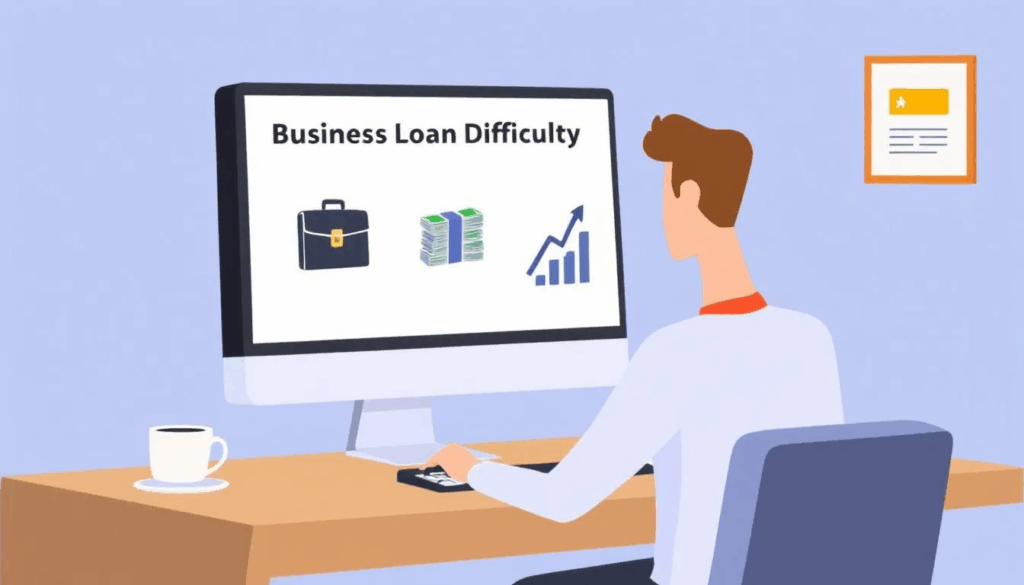What is a Small Business Loan?
A small business loan is a financial product specifically designed to provide funding for small businesses, unlike personal loans. These loans come in various forms, catering to different business needs.
Commercial lenders are crucial in offering small business financing to new and established businesses. They assess factors like personal credit score, cash flow, and the company’s overall financial health before approving the loan application.
Small business loans offer numerous benefits to entrepreneurs. They provide access to new funding options, helping businesses manage their cash flow effectively. These loans enable companies to expand or grow without solely relying on personal credit scores or savings.
What types of Business Loans are available?
There are many different types of small business loans, each offering unique features. Some business loans are intended for a specific purpose, while others provide general funding for various business purposes. Many small business loans offer competitive rates.
The following small business loan options are available through our network of lenders.
Business Term Loan
- Loan Amounts: $5k – $10 million.
- Factor Rates: 1% – 4% per month.
- Term: 3 months – 10 years.
- Speed: 1 – 3 business days.
Business term loans are a type of financing in which a company borrows a lump sum, repaid over a set period with fixed interest rates. Businesses commonly use them to fund expansion, purchase equipment, or cover other significant expenses. They offer predictability in payments and are ideal for long-term investments in a company’s growth. Traditional term loans are lump sums that you pay back over time with interest. An unsecured term loan doesn’t require collateral, while a secured term loan does.
Business Line of Credit
- Credit Limits: $1k – $1 million
- Factor Rates: Starting at 1% per month
- Term: Up to 36 months
- Speed: 1 – 3 business days
A business line of credit is a flexible financing option for businesses to access funds as needed. It allows companies to borrow up to a predetermined limit and only pay interest on the amount used. This revolving credit line can help manage cash flow and cover unexpected expenses.
SBA Loans
- Loan Amounts: $50k – $10 million
- Factor Rates: Starting at Prime + 2.75%
- Term: 10 – 25 years
- Speed: 4 – 12 weeks
The U.S. Small Business Administration (SBA) guarantees general small-business loans through the 7(a) loan program. These government-backed loans are designed to help small businesses access funding they may not otherwise qualify for through traditional lenders. SBA loans have low interest rates and long repayment terms. SBA loans are not available for nonprofit organizations.
SBA 7(a) loans are the most common option in the loan program. SBA 504 loans provide funding for commercial real estate and other fixed assets. SBA loans can reach up to $10 million. SBA microloans offer funding up to $50,000, which companies can use for startup costs.
SBA loans can be used for various purposes, such as purchasing equipment, real estate, or working capital needs. Overall, they provide valuable financial support to small businesses in need.
Equipment Financing
- Loan Amounts: Up to $10 million per piece of equipment
- Factor Rates: Starting at 6.5%
- Term: 1 – 10 years
- Speed: 1-2 business days
Equipment financing is a financial solution that allows businesses to acquire necessary equipment without paying the total cost up front. Instead, they can make fixed monthly payments over a set period. This enables companies to manage their cash flow while maintaining access to the necessary tools and machinery for efficient operation and growth.
Working Capital Loans
- Loan Amounts: $1k – $10 million
- Factor Rates: Starting at Prime + 2.75%
- Term: 3 months – 10 years
- Speed: 1 – 3 business days
Working capital loans are short-term financing options that cover day-to-day operational expenses like payroll, inventory, and bills. They help businesses manage cash flow gaps and maintain smooth operations. These loans are usually unsecured, meaning no collateral is required, making them accessible to many businesses.
Is it Hard to Get a Business Loan?
The difficulty level of obtaining a business loan varies by industry, type of business loan, and lender. In addition, factors like your credit score, time in business, annual revenue, assets, and cash flow all influence whether or not getting a business loan is challenging.
The longer a business has been operating, the more favorable the approval odds. If you have been in business for less than two years, it can be difficult to qualify for a traditional business loan.
The process of getting a business can seem overwhelming. Deciding on what loan, how much you need, what lender, and whether or not you qualify can be daunting for any small business owner.
How to Make Getting a Business Loan Easier
Here are some tips to help demystify the business loan process and make it easier.
- Improve your personal and business credit score.
- Prepare a solid business plan.
- Have financial documents ready and organized.
- Show consistent revenue and profitability.
- Consider alternative lenders if traditional bank loans are not an option.
- Offer collateral, such as business assets, to secure the loan.
- Seek professional advice from financial advisors or business loan brokers.
What are the most common challenges to getting a Business Loan?
Here are a few reasons some small business owners struggle to get a business loan.
Eligibility Criteria
Commercial lenders set specific requirements for small and new businesses. These include good personal credit scores, stable cash flow, and detailed financial statements. Meeting these criteria is crucial for loan approval.
Application Process
The application process for a business loan can be complex and time-consuming. Many lenders have rigorous procedures that involve extensive documentation and a thorough review of the business’s financial health. This ensures that only eligible businesses receive the funding they need.
When applying for a business loan, preparing all required documents and information beforehand is essential. Be ready to provide detailed financial statements, tax returns, and other relevant paperwork to support your application.
Benefits and Risks
Before applying for a business loan, it’s crucial to evaluate both the benefits and risks involved. Acquiring additional capital through a loan can help businesses grow and expand their operations. However, taking on debt also comes with risks, such as potential financial strain and difficulty in repayment.
It is vital to assess the benefits of obtaining extra capital against the risks of accumulating debt. Businesses should ensure they have a solid plan to utilize the funds effectively and generate enough revenue to repay the loan on time.
How do you qualify for a Small Business Loan?
To qualify for a small business loan, you need to meet specific eligibility requirements set by lenders. Typically, lenders look at your credit score, business history, revenue, and financial statements.
The documentation required for a loan application includes proof of income, tax returns, business plans, and financial projections. Some lenders may also require personal financial statements. Accurate and detailed documentation is crucial to the approval process, as it can demonstrate a proven track record of financial success.
Tips for improving your chances of qualifying for a business loan include maintaining a good credit score by paying bills on time and reducing debt. A solid business plan with clear objectives and financial projections can impress lenders. It’s crucial to show that you’ll use the funds for business purposes that can increase revenue.
How do I apply for a Small Business Loan?
Every lender has a different application. At UCS, we aim to make the process as quick and easy as possible. Follow these steps to apply.
Step 1: Apply Online in a Few Minutes
You can complete our one-page online application in just a few minutes. Before applying, it’s best to know how much funding you need. If you need help along the way, you can contact us by phone, email, or chat.
Step 2: Get Expert Advice on Loan Options
After you apply, one of our knowledgeable business experts will contact you to discuss your loan options, details, and requirements. The loan executive will also discuss costs so there are no hidden surprises or fees.
Step 3: Finalize Your Loan Application & Get Funded
Your account executive will work with you on closing the loan. Depending on the type of loan, you could receive your funds in 1-3 business days after approval.
What are the benefits and drawbacks of Business Loans?
Small business loans offer numerous benefits to entrepreneurs looking to grow their businesses. These loans provide the necessary capital to invest in expansion, purchase inventory, hire new employees, or upgrade equipment.
They can also help improve cash flow and provide flexibility in managing day-to-day operations. Additionally, securing a business loan can help establish and build credit for the company, opening up opportunities for future financing at more favorable terms.
One major drawback of small business loans is the potential burden of debt repayment. Taking on a loan means committing to regular payments, which can strain cash flow, especially for newer businesses with unpredictable revenue.
Additionally, high interest rates on loans can increase the overall cost of borrowing, cutting into profits. In some cases, failure to repay a business loan can result in severe consequences, such as damaged credit scores or even the loss of the business itself.
Small Business Loan Pros & Cons
Pros:
- Provides necessary funds for business growth and expansion.
- Allows for increased cash flow to cover operational expenses.
- It can help improve a credit score if payments are made on time.
- May offer lower interest rates compared to other financing options.
Cons:
- Requires repayment with interest, adding to the overall cost.
- Qualifying can be difficult, especially for new businesses or those with poor credit.
- Risk of default if the business struggles to generate enough revenue.
- Potential for personal assets to be used as collateral.
Frequently Asked Questions
Here are the most common questions about the challenges of getting a business loan.
What credit score is needed for Small Business Loans?
Minimum credit score requirements vary depending on the lender, type of loan, and your business’s financial performance. Traditional lenders, like banks and credit unions, typically require high credit scores ranging between 670 and 740, but some may offer lower credit standards on some products.
Other lenders, like alternative lenders, have much more lenient credit score requirements, typically starting around FICO scores of 600. Others offer bad credit business loans for borrowers with scores below 600. Some business loan alternatives, like merchant cash advances, may not have any credit score requirement, as approval and repayment depend on your revenue.
What are the easiest Small Business Loans to get?
Business loans that have collateral, known as secured loans, are typically easier to obtain than unsecured loans. Examples include equipment financing or a business term loan with collateral. Most SBA loans also have collateral requirements.
Another option is getting a revolving line of credit instead of a loan. Business lines of credit are often more accessible than business loans.
It’s typically easier to get a business credit card than a line of credit, but the tradeoff is that most credit cards have higher interest rates and lower credit limits. Online lenders generally provide small-business loans of up to $500,000.
Alternative Business Funding Solutions
Some of the most accessible ways to fund a business are with alternative solutions. These are not loans in the traditional sense, as they are not categorized as debt. Here are a few alternative financing solutions available through our funding partners.
Merchant Cash Advance
- Amounts: $5k – $5 million
- Factor Rates: Starting at 1% – 6% p/mo
- Term: 3 – 24 months
- Speed: 1 – 2 business days
A merchant cash advance is a quick and convenient financing option for businesses. It involves receiving a lump sum payment in exchange for a percentage of future credit card sales. This alternative funding solution is ideal for businesses that need immediate capital but may not qualify for traditional loans. This form of financing uses a factor rate instead of an annual percentage rate (APR).
Accounts Receivable Factoring
- Amounts: $10k – $25 million
- Factor Rates: Starting at 1% p/mo
- Term: Up to 24 months
- Speed: 1 – 2 weeks
Accounts receivable factoring is a financial tool in which businesses sell their unpaid invoices to a third party at a discount for immediate cash. This helps companies improve their cash flow by receiving funds quickly instead of waiting for customers to pay invoices.
Revenue-Based Financing
- Amounts: $5k – $5 million
- Factor Rates: Starting at 1% – 6% p/mo
- Term: 3 – 24 months
- Speed: 1 – 2 business days
Revenue-based financing is a form of funding where a company receives capital in exchange for a percentage of its future revenues. Unlike traditional loans, repayment fluctuates based on sales, making it a flexible option for businesses with unpredictable cash flow.
Other Funding Options
Other business owners may seek different funding options, such as:
- Grants: Grants do not need to be repaid, making them appealing to business owners. Grants can have competitive application processes and long wait times.
- Crowdfunding: Crowdfunding typically does not require credit checks or interest payments, depending on the platform. Crowdfunding platforms often charge fees, including payment processing fees.
- Business Credit Cards: A business credit card could be a potential short-term solution to fund your business. However, it’s essential to pay off balances as high interest rates could lead to excessive debt payments, compromising your company’s financial health.
- Peer-to-Peer Lending: Peer-to-peer lending involves borrowing money from one or more investors, with fixed monthly repayments.
Why is it difficult to get a Business Loan from a Bank?
Securing a business loan from a bank can be challenging due to the extensive financial documentation required. Traditional bank options include term loans, lines of credit, and commercial real estate loans.
Banks prefer to offer low-rate business loans to borrowers with credit scores in the good and excellent ranges, or 690 and above. Traditional banks, such as Bank of America’s Business Advantage program, typically look for at least two years of business history when approving a loan.
Lenders place a heavy weight on your cash flow, credit history, and time in business. Many lenders require that you have a debt-service coverage ratio that shows your business can afford an additional loan or debt. They want to ensure you have enough cash flow to cover debt payments.
New businesses or those with poor credit face higher risks, making loan approval difficult. Personal credit scores are crucial, especially for new businesses without established credit histories. Lenders often prefer established businesses with steady cash flow, putting newer businesses at a disadvantage.
Some small business owners have better luck with microlenders and community-based lending organizations, especially if you’re seeking a first-time business loan. Microlenders typically make small loans of less than $50,000. Kiva and Accion Opportunity Fund are examples of nonprofit microlenders.
How Hard is it to Get a Small Business Loan with Bad Credit?
Getting a small business with a low credit score is more challenging, but not impossible. Some lenders specialize in bad credit business loans. Even with a low credit score, you could potentially qualify for business loans with the following features from our lending network:
- Amounts: $1k – $5 million
- Factor Rates: Starting at 1% – 6% p/mo
- Term: 3 months – 5 years
- Speed: 1 – 3 business days
However, you should be aware that business loans for bad credit often carry lower borrowing amounts and much higher interest rates and fees. In addition, these loans are typically for shorter periods and require frequent repayment. That combination could further strain your cash flow, leading to financial struggles.
On the other hand, most bad credit funders are online lenders that offer an easy application process and fast funding. Making timely payments could also help you repair damaged credit.
For these reasons, some small business owners use bad credit business loans as bridge financing. They can provide short-term funding to sustain operations while improving credit scores to qualify for more advantageous options.
How Hard Is It to Get a Small Business Loan – Final Thoughts
Obtaining a small business loan can be challenging, but it is possible with the proper preparation and research. You must have a clear understanding of the lender’s requirements.
Exploring alternative funding options can also increase your chances of securing a small business loan. Persistence and determination are key when navigating the loan application process.
Contact us for more guidance on qualifying or to apply for a small business loan. Our alternative funding experts can help you find the best financing options for your business needs.













